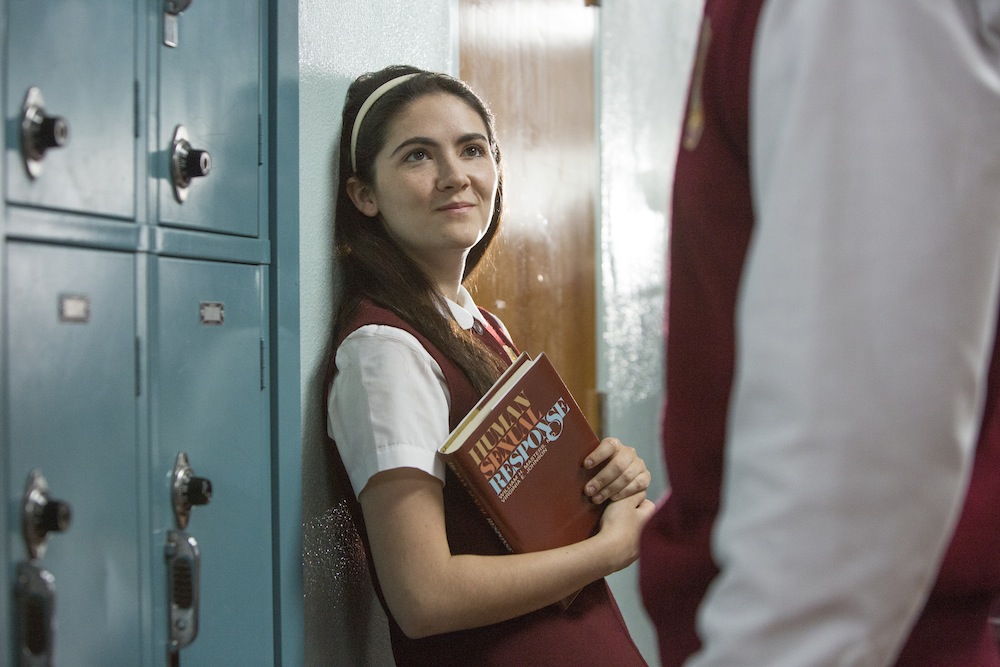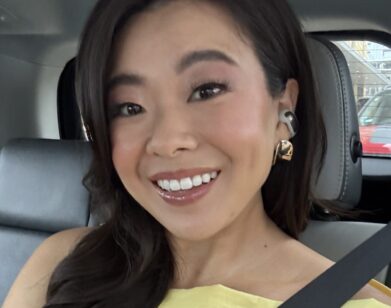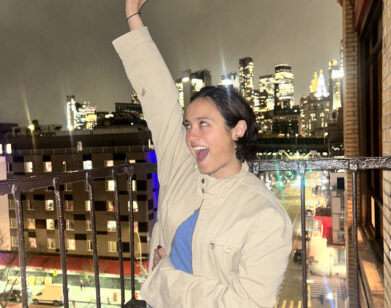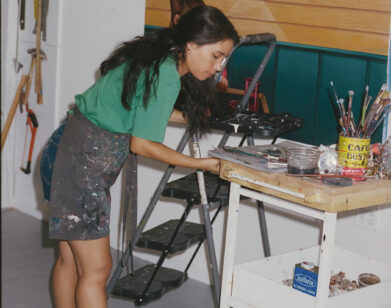Rebel with a Cause

ABOVE: ISABELLE FUHRMAN IN MASTERS OF SEX. PHOTO COURTESY OF MICHAEL DESMOND/SHOWTIME.
As Tessa, Virginia Johnson’s razor sharp 15-year-old daughter on Showtime’s Masters of Sex, Isabelle Fuhrman scorches. The truth-bomb dropper disrupts one of the most sophisticated stories on television. Drinking, smoking, and spitting fire, she nails the back talk that strikes both Bill Masters (Michael Sheen) and Johnson (Lizzy Caplan) mute. Tessa contextualizes not only the crashing wave of the 1960s, but a timeless story of an attention-hungry teen who demands independence but aches for someone to depend on.
Throughout her short but hefty career, the 18-year-old Atlanta native has been a lightning rod for badass roles—young women with an unnerving edge. Fuhrman’s formative years were happy—a mother she could sit on the couch and vent to and a father who once whisked her away to Disneyland on a whim—but she’s particularly wired to play the rebel. At 10 years old, she landed the starring role in the demonic horror movie Orphan (2009) opposite Vera Farmiga and Peter Sarsgaard. She worked her magnetism as Clove, one the Katniss’ rival tributes in The Hunger Games (2011), and as Val, the Catholic school refugee who fakes a suicide attempt in All the Wilderness (2014). In Hellbent, out next year, she stars as a goth runway named Danni Frost alongside Martin Henderson. She also recently wrote a short film Happenstance, a generous story about a chance encounter between a brittle woman and widowed father.
Masters of Sex, however, is Fuhrman’s first time on a television series. It’s a new medium and a robust role, but the recent high school graduate supplies Tessa with plenty of quirks: crossing her legs on the table, nibbling away at her nails, and generally vacuuming everyone in with her unforgiving stare.
ASHLEY HOFFMAN: In the new season of Masters of Sex after the five-year midseason time jump, we meet you for the first time as Virginia Johnson’s rebellious daughter Tessa. In your view, what is Tessa fighting for?
ISABELLE FUHRMAN: As a teenager you want independence. What’s different about Tessa is she’s constantly been away from her mom. In Season Two, Lizzy [Caplan] gives up the kids basically, and I think it’s because of that lack of nurturing from her mother that Tessa’s sense of rebellion doesn’t just come for a want for independence from her mother, but more from a need to be noticed, and that’s why she acts out. She wants her mom to pay attention to her, but her mom is always busy doing her job.
HOFFMAN: It’s a very honest approach to the relationship. It’s almost like your character is intimidating to her mom. What have you discovered about the power dynamic through working with Lizzy?
FUHRMAN: Tessa knows what buttons to push, and knows that her mom does feel bad that she has to work all the time and can’t be around her and there are lot of things going on in her life that she can’t admit to Tessa. Tessa knows how to use that in all of the arguments. Lizzy and I were laughing because the other day, we were filming and we had a very nice moment, the two of us. Normally my character gets the last word and leaves. But we had a scene the other day that was spurred by my character asking [Virginia] how her day was, which is not something that’s ever come out of Tessa’s mouth. It’s more about trying to get her to pay attention to Tessa in other ways that aren’t necessarily good. It was cool to explore that relationship because it was the first time that we got to look at each other and have a feeling of love for each other, which was really important to show.
HOFFMAN: That’s lucky. What do you and your fictional mom bond over?
FUHRMAN: Lizzy’s great. We talk about reality shows and shoes and clothes and technology when we’re in our makeup trailer getting our hair and makeup done. It’s the ’60s, so that takes a long time. It’s funny, one of the makeup artists Lana, she watches The Bachelorette and so do I and so does Michael [Sheen] apparently.
HOFFMAN: Does he really?
FUHRMAN: I know, I was so shocked too. So we all talk about The Bachelorette, and Lizzy kind of comments from time to time. She’s just a very real person and so friendly. I watched Mean Girls when I was young, so it was cool to be able to meet her, and she’s such a great comedic actor and really fantastic actress to work alongside. I’m so happy that I could do this with her. She’s part of the reason why I ended up deciding to take the part. When I originally met with [creator] Michelle Ashford, it was supposed to just be us, and Lizzy decided to come to my meeting along with Amy Lippman, who is one of the writers and producers. We sat down and Lizzy was singing the praises of all the people on Masters of Sex. We really do have a very strong group of women. That was one of the main reasons that I decided to do it. I really loved talking to Lizzy, and I could so see us feeding off of each other and making something really great out of our relationship.
HOFFMAN: What’s an example of changes you make to your scenes together?
FUHRMAN: Sometimes there’s a minor line change or Lizzy and I read through a scene and something just doesn’t feel right, and a movement needs to be moved. When I worked on the third episode, I worked with Miguel Sapochnik [a director] from Game of Thrones. I was still getting to know Tessa, and he helped me a lot. Like, let’s have her be more outgoing when people are shy, and let’s have her pull back more when people are more forward with her. I think that was great to learn because throughout the rest of the show, I’ve been putting that into scenes.
HOFFMAN: This show has a ton of secrets and bottled up emotions. I feel like your role as a teenager is so critical because Tessa disrupts all of that. What do you see as Tessa’s purpose in terms of the big picture?
FUHRMAN: I think right now she’s meant to give Virginia a wake up call. [Virginia] has put work first, and she will probably continue to do so, but I have a feeling there will be a point at which the two of them will figure it out or don’t figure it out, and I think it will be interesting to see which way they decide to take it. As of right now, there’s a lot of friction. Having a mom in the ’60s write a book about sex makes kids treat you differently, and they’ve explored that with Tessa’s relationships with boys. She doesn’t really have a mom she can go to and talk to about those sorts of things. I’m hoping that they will connect.
HOFFMANN: Like what you have.
FUHRMAN: Yeah, like something that I have. Being able to play her is almost easier because I know what it’s like to have a great relationship with my mom, and I know how hard it would if you wanted that sort of attention. She has a great relationship with Libby [Masters, Bill Masters’ wife] because she almost wishes she could be a part of Libby’s family. Libby is such a homemaker and is constantly taking care of her kids and making sure everything is great in the Masters home. At the same time, Tessa loves her mom, but she can’t get past the fact that her mom’s not there for her. Virginia’s dedicated to her work, but she’s also staying so late [because of] her affair with Bill. That is a very difficult thing to go through with your mom—to know that that’s going on and not be able to talk to her about it or confront her about it because of her fear for what might happen. There’s an anger—a disgust.
HOFFMAN: Is doing this role crossing some kind of threshold for you in your career?
FUHRMAN: It is. [With TV] I’ve always felt like, “Oh, I’ll do this part and I’ll get bored.” I really loved Tessa when I read the first episode, and I was so worried that I would be bored, but we’re on Episode Eight, and every single time I get a new script, I’m always like, “Oh! That’s so that’s cool!” I constantly get these little gold nuggets and gold pieces about Tessa that I can add to my box of notes about her from each episode—just these little details that other people say and things that she said.
HOFFMAN: You have an actual box of ideas?
FUHRMAN: It’s an actual box. It’s one of the index boxes that I used to put flashcards for the SAT and ACT in.
HOFFMAN: And now it’s filled with stuff about a sex study show.
FUHRMAN: Yup! My friends’ parents say, “What are you doing this summer?” And I say, “I’m working on Masters of Sex,” and then there’s a long silence…”It’s a television show on Showtime.” “Ohhh.” There are some people who are fans and are really excited, but the name gives off a sort of vibe that not everyone is quite so into.
HOFFMAN: When your character kisses Bill Masters—that pivotal moment after she’s been secretly drinking—she pulls off her top and forces herself on him, and it sets so much in motion. Of course his son sees, and then, they both collide. What was it like doing that scene?
FUHRMAN: That was a scene I was really nervous for because I’ve never had to do something like that. I’ve had to kiss people on camera, but to be vulnerable with your top opened up, it’s a very different situation to be in. I had just signed onto the show. It was one of our last days of filming the first episode. I kept reassuring myself that these are real people; Tessa’s drunk and she’s a mess, and that’s how people act sometimes when they’re a mess. She knows that she’s got some power over people. Michael was so, so great. We rehearsed it and we did the kiss and it was a closed set and everyone was super respectful. The minute they called cut, Michael threw a towel over me every single time, which was so nice. When we were done, it was like, “Whoa, I did that!’ It was almost liberating.
HOFFMAN: You mentioned moments of “magic” when you collaborate with other people. What’s an example?
FUHRMAN: When I was doing Orphan, and I was 10, I had a scene with Vera [Farmiga] where I was reading her diary, and they ended up cutting it because it showed too much of the story. I was ready to do it for a while, and take after take, it ended up hitting this plateau and not really going anywhere. It was frustrating for all of us. And I remember Vera pushed me in the scene. She pushed me down into the chair that I was sitting in when I stood up. It completely changed the energy of everything. We started over, and the scene was amazing, and we were crying and fighting, and that was like magic to me. I felt like I wasn’t even there; the scene turned out really great because we both were in that moment.
HOFFMAN: What parts didn’t happen for you?
FUHRMAN: There are so many. I think every single young actress went out for Shailene Woodley’s part in Fault in Our Stars. I met with Josh [Boone, the director] and I had are really great conversation with him. I thought it went well and sometimes you just don’t click. Paper Towns was another example, and Hunger Games was another one. You have to learn to be excited for the next person that gets it. The first time that ever happened was The Way Back that Peter Weir directed. I love him. I would do a commercial of his. I went out to audition for it and met Peter. I went in a bunch of times and everyone on my team was telling me, “You’re going to get the part!” And they cast Saoirse Ronan, who I think is amazing. I love her. I was so bummed that I didn’t get it, but we have completely different energies as people and that’s all I can really pinpoint, because I know I did a good job or else they wouldn’t have had me come in so many times. If they don’t like you, they just don’t have you come back. It’s like The Bachelorette—they’ve got a lot of options. You could be the one, but you never know.
SEASON THREE OF MASTERS OF SEX PREMIERES THIS SUNDAY, JULY 12, ON SHOWTIME.






